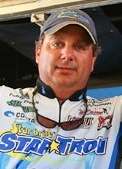
I’m sure you’ve heard the old saying, “When life hands you lemons, make lemonade.” Well, my 2015 season turned out to be a big sack of lemons — easily my worst overall season since first dipping my toes into the Opens in 2004. By early July, it was pretty obvious that my chances of qualifying for the 2016 Bassmaster Elite Series were all but gone. Bad starts in all three Bass Pro Shops Bassmaster Opens divisions had me way too far back in points to have any realistic shot at qualifying. I’ve never been a fan of the three-tournament system for qualifying, but that’s a topic for another day.
After rough starts, I decided to make lemonade for the remainder of the year. For me and my long-term objectives, that meant doing things that would make me a better competitor down the road. Sure, the thoughts of a “go big or go home” or “swing for the fences” to win one and get to the Classic approach crossed my mind and even factored heavily into my game plan at the final Southern Open on Lake Seminole. Needless to say, it didn’t work. But at the other season-ending events (Erie and Table Rock), I focused on getting better; I fished my weaknesses.
We’ve all heard the babble about how you should fish your strengths. I generally agree with that approach and usually follow it. Obviously, if your goal is to make checks, earn points and win tournaments, you should probably do what you’re good at. But if you always fish your strengths, your weaknesses will never go away.
Being from Florida, I don’t get a lot of opportunities to fish for smallmouth on big water — or on any water, for that matter. I love to catch them, though … a lot. I drop shot a good bit and consider it a strength technique. So, when I’m on smallmouth water, I almost always focus on the drop shot. At Erie this year, I left the drop shot in the rod box.
In general, cranking is not my strength (I firmly believe that treble hooks are evil) and certainly cranking for smallmouth in 4-foot waves is way outside my comfort zone. Really, anything in 4-foot waves is outside my comfort zone. But from recent tournament reports, I knew there could be a good crankbait bite, not to mention that Jonathon VanDam and Chad Pipkens have both won fall Opens fishing crankbaits on Erie. So off I went to Erie with a pile of St. Croix Mojo Cranking Rods fitted out with Strike King 5XD’s and other treble hook adorned morsels firmly strapped to the front deck.
While I finished just outside the money cut (54th), I learned a ton and got better each day. I played with hook combinations to figure out how to keep smallmouth buttoned up while battling the waves. I learned how to position and control the boat drift to hit the key rocks with multiple casts. I learned the importance of having multiple rods ready when the school fires, just shortly after learning that zebra mussels are really bad for fishing line. I learned how to play and land big smallmouth on treble hooks in big waves. I learned how to manage time and locations in big water (I screwed this up on Day 1 and left way too early), and I gained a ton of confidence in driving the Triton in big water conditions.
At Table Rock, I knew I’d either need to fish really deep or really shallow. Being a guy that usually has no less than five St. Croix flipping sticks in the boat at any time, my natural tendency is to go shallow. Instead, I focused on the deep bite. Practice was good, and I was catching good numbers in the 20-25 foot range. I got a lot of practice using the side-imaging on my Humminbird graphs to locate brush piles and even got really comfortable picking out catchable fish on the images.
A major cold front hit the first morning of competition and seemed to move all the keeper-sized fish out of the brush. Table Rock has a 15-inch size limit on everything. I was catching ridiculous numbers of short fish, but couldn’t catch keepers. Toward the end of the day, I told my co-angler that I bet the bigger fish had moved out deeper and suspended. The second day, I finally convinced myself to go find them.
Now keep in mind, I’m from Florida. We don’t have much water deeper than 10 feet and our fish don’t “suspend.” But after three or four hours of effort and a little trial and error with my Humminbirds, I found them, right where I thought they were, suspended off the ends of points, halfway down in 70 plus feet of water. I had a blast catching them video-game style for the last half of the day and ended up with a respectable limit. Not enough to cash a check, but it gave me a huge boost in confidence regarding the use of my electronics, trusting my instincts and getting out of my comfort zone.
In two tournaments that at first glance may seem less than successful, I came away with a great deal of confidence and some really good lessons that should pay dividends down the road. I also had a lot of fun, something that can easily be lost when fishing for points and checks.
One of the coolest things about this sport is that there are so many ways to solve the puzzle. I’d like to think a few pieces fell into place during this otherwise lemony season.

